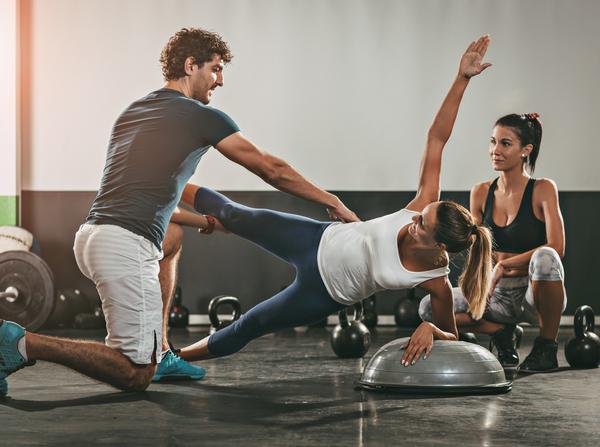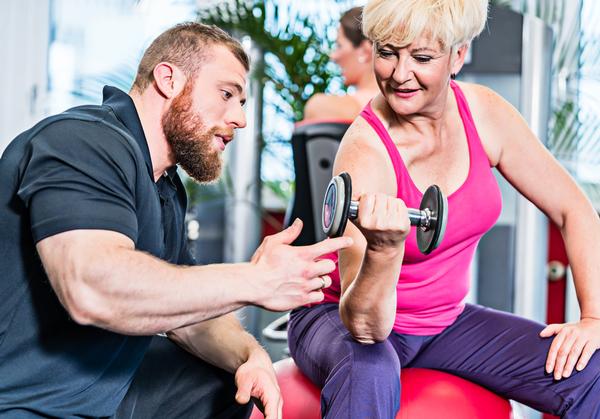 SELECTED
ISSUE
SELECTED
ISSUE
|
|
Leisure Management - Personal boundaries

Talking point

|
|
| Personal boundaries
|

Can you be sure all members, of both genders and all ages, feel equally comfortable in your gym? Or do some feel overlooked while others feel
too exposed? Kath Hudson reports
|


Personal trainers should adhere to strict boundaries when working with clients
|
|
|
Like spa therapists, personal trainers have to be very aware of the boundaries between themselves and clients. There’s no research to show how often this boundary is crossed, but a Google search shows it happens. It may often be inadvertent, spending just that little bit too long chatting with an attractive young member while other members go unnoticed. But for some, that will be enough to make them feel uncomfortable. There have also been some high-profile liaisons: the father of Madonna’s first child was her PT while the Swedish Crown Princess Victoria married hers. Clients can come to rely on their PTs – sharing confidences, using them as unofficial counsellors, putting them on a pedestal – so it’s important that PTs are mindful of keeping things professional, and that they’re trained to do so. How does the sector ensure the right balance is struck? We ask the experts.
|
|
|
I’ve been a member of a busy, London-based budget gym for about five years and have witnessed a lot of casual sexism on the gym floor in this time. The atmosphere can sometimes be akin to a nightclub, with the same sexual politics. Personal trainers frequently act in a way that wouldn’t be considered appropriate in other industries: touching young women and encroaching on their personal space during one-to-one sessions.
Their interactions with young women often come across as chatting them up, whereas older people are generally ignored. I think, if you looked at the CCTV footage of who they engage with, it would be very telling. There have been times when I’ve wanted to tap into the expertise of the personal trainers, but I’ve always had to take the initiative. As a male in my 50s, they’ve never approached me and rarely acknowledge me.
My daughters, who are both in their 20s, feel uncomfortable in this environment and have decided to stay at the posher, more expensive family-orientated club which we all used to go to together. I wonder how many other women have been driven away from gyms because they feel uncomfortable?
As far as I can see, most of the time this behaviour is not with nasty intent: it’s ignorance, and in some ways might be seen as compensation for a lack of professional confidence. These instructors need to be taught how to behave in an appropriate way around women, and to be mindful about dealing with all members equally.
In my opinion, an official code of conduct is needed – one that sets the boundaries for how fitness instructors relate to customers, and particularly female ones, in terms of personal space, touching and what women are asked to do. There should be a mode of interaction, so women don’t feel they’re being chatted up if they’re having a PT session or being engaged in gym-floor conversation. It should be part of their training and qualifications, and the gym management should also have a duty of care to their clients.
I’m concerned that, at present, there appear to be no clear boundaries, and that this issue isn’t being addressed in training or taken seriously by some operators. The manager of my gym was baffled when I mentioned it to her.
No-one seems to be talking about this, or even interested in it, which suggests that – when it comes to some of the most basic elements, and potential pitfalls, of human interaction – gym culture is really still in the Stone Age.
"Personal trainers frequently act in a way that wouldn’t be considered appropriate in other industries" – Chris Grant
|
|
 |

Rob Johnson
Deputy head
YMCAfit
 |
|
This is a really interesting topic and it’s important to start the conversation. I wasn’t aware it was such an issue until a number of my female colleagues told me they’d experienced sexism in gyms, at various levels.
Although we’re endeavouring to be ever-more inclusive with our training programmes, sexism is something we haven’t addressed yet. It’s important we do: if women don’t feel comfortable at the gym, they’ll simply stop attending.
YMCAfit is already redeveloping its entry-level training programmes to embed more soft skills and really focus on inclusivity. These will soft launch in April.
I think we’ll also go so far as to discuss sexism in our instructor training, and we’ll look to get more evidence about the current situation and reports on female participation.
So what can operators do? I think it’s important to have a mixed workforce with strong female role models, as this engenders a more inclusive environment and breaks down stereotypes. We frequently find we have groups of lads on our courses who think they’re the bees knees, but when matched with strong female tutors this bravado turns into respect.
Senior management training is also key. Managers need to ensure their staff are engaging with all members, and not inadvertently creating barriers that will lead to lost custom. In fact, many trusts are feeding back to us that they’re looking for fitness instructors and PTs who are well-rounded and can relate to a wide range of people. The more empathetic they are with all types of member, the more successful the business will be.
"It’s important to have a mixed workforce with strong female role models, as this breaks down stereotypes" – Rob Johnson
|
|
 |

Callum Towler
PT manage
Everyone Active
 |
|
Everyone Active has put in place processes and procedures to ensure our fitness instructors and personal trainers perform to high professional standards.
All our trainers are required to sign our code of conduct, which sets out boundaries in personal relationships, behaviour on-site, behaviour off-site when in uniform, and data protection alongside a whole host of other points. Employees and freelancers alike sit down with managers at the outset and go through these expectations and operational standards.
Many younger PTs can have the perception that only younger people will want to invest in PT, so they can be inclined to focus their efforts on a narrow market of people like themselves. Also, they often feel more comfortable interacting with people their own age. Although this may come across as discriminatory, it’s usually down to a lack of confidence and training and can usually be easily rectified.
Everyone Active seeks to address this by giving additional training to our PTs on how to market themselves, close sales, approach new clients and what the role of the PT really is.
We encourage our team to broaden their view of who may want to buy their personal training services, and we ensure that they’re equipped with the skills they need to interact with a wider variety of people.
Sometimes it can be difficult not to cross boundaries: some PTs develop a strong rapport with clients and become friends, but we encourage them not to use this as a comfort zone and gravitate only towards the people they know in the gym to the detriment of other members.
Finally, Everyone Active aims to build a diverse group of personal trainers. A diverse range of PTs means that we’re better equipped to deliver services to a diverse range of members.
| |


|
| PHOTO: SHUTTERSTOCK.COM |

Everyone Active is committed to building a more diverse team of PTs |
|
|
 |

Geraldine Tuck
Operations director
ukactive
 |
|
There’s no doubt sexism remains a major issue for society, and something I know many women have faced. But as someone who has spent most of their career in gyms, I don’t think this is more of a problem in our sector than anywhere else, and there isn’t any robust data to suggest otherwise.
Given the number of misconceptions that gyms already come up against, we at ukactive feel it’s important to stand up for the sector and challenge assertions that detract from it without any solid evidence.
The notion that the gym is an unwelcoming environment for women doesn’t stand up to scrutiny when you consider our sector has one of the highest levels of female participation.
In terms of procedures to guard against such issues, physical activity professionals have a duty of care to their clients to behave with respect and integrity at all times; this is enshrined in the code of ethical practice from REPS and the new CIMSPA Code. There’s also the legal framework of the Equality Act to safeguard against sexism, as well as standard employment contracts which govern behaviour at work. If ever an exercise professional fell below these standards, I would expect their employer to quickly show them the door.
It’s clear that as a society we still have a long way to go to reach gender parity, and the most practical step we as a sector can take to address this is to look at our staff make-up. There are still too few women in senior management roles. We must redouble our efforts to address this glaring shortcoming as soon as possible.
"Sexism remains a major issue for the whole of society. I don’t think this is more of a problem in our sector than anywhere else" – Geraldine Tuck
|
|
 |
| Originally published in Health Club Management 2017 issue 3
|
|
 |
|